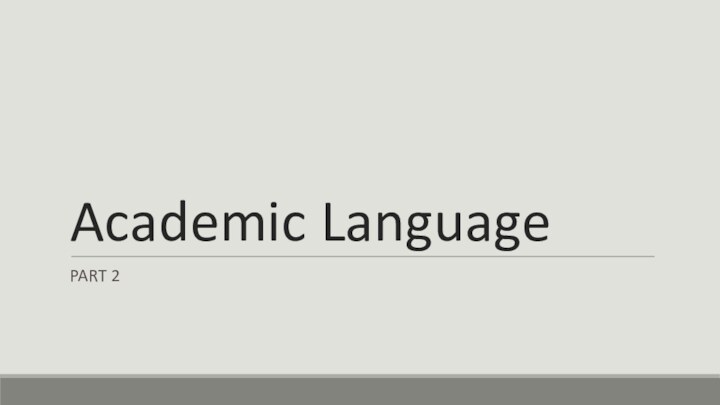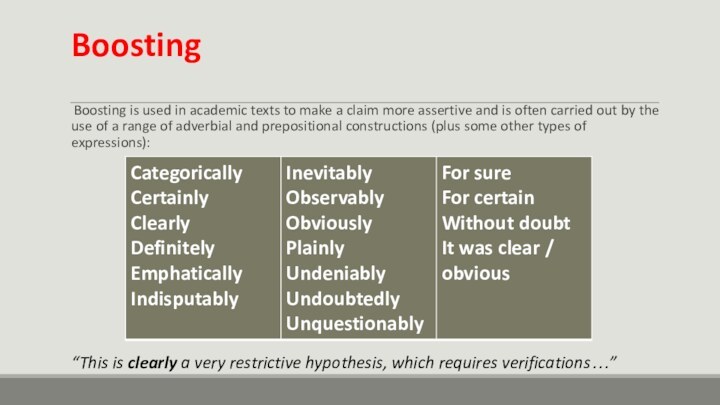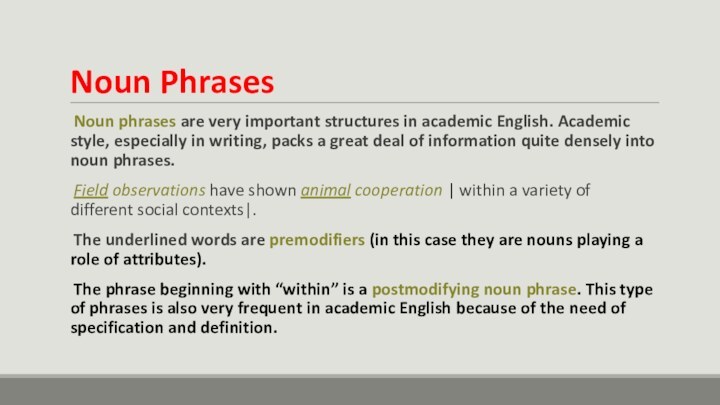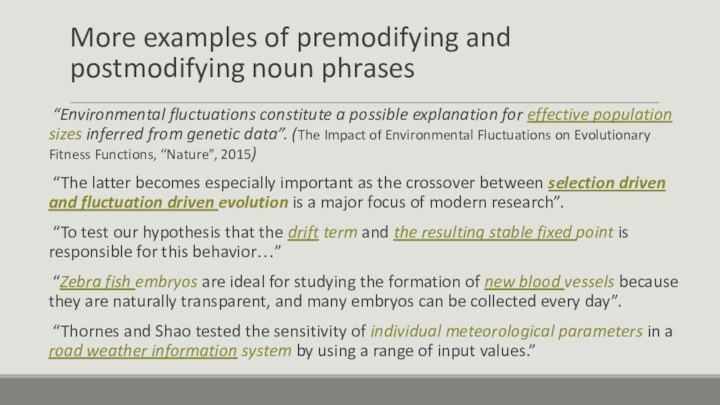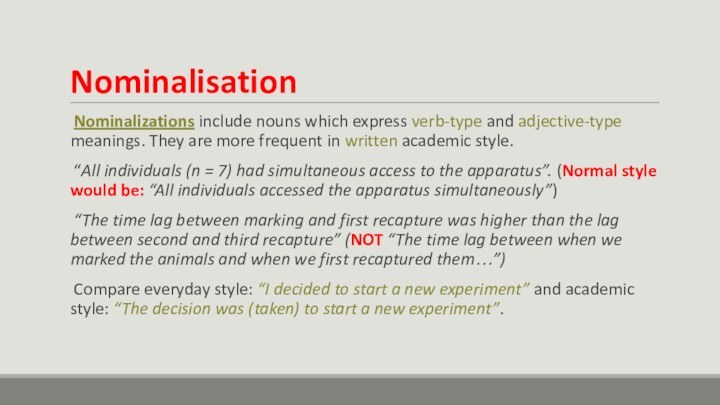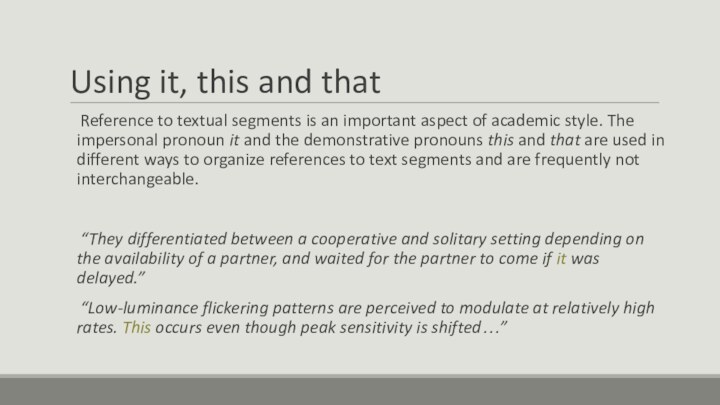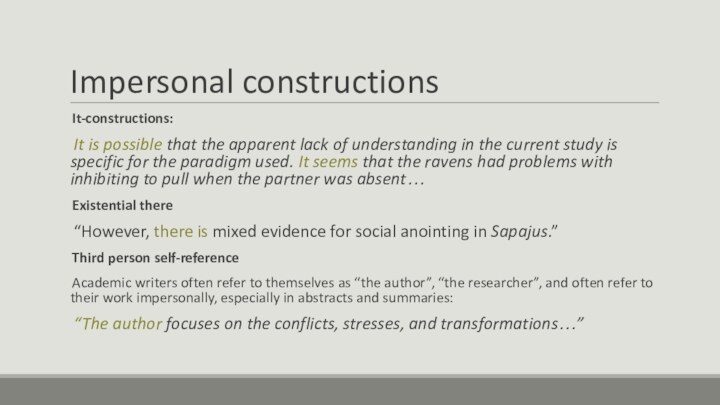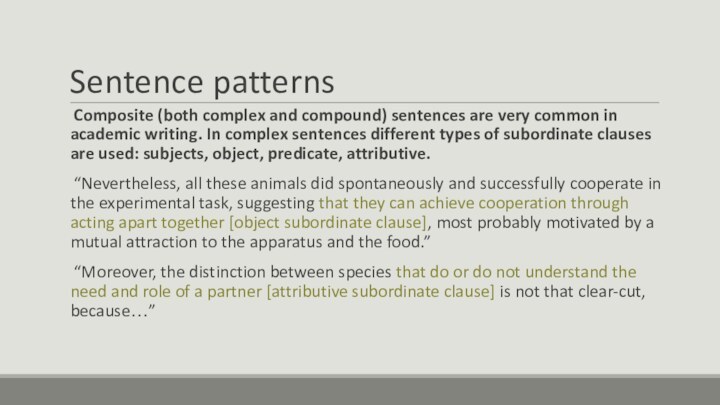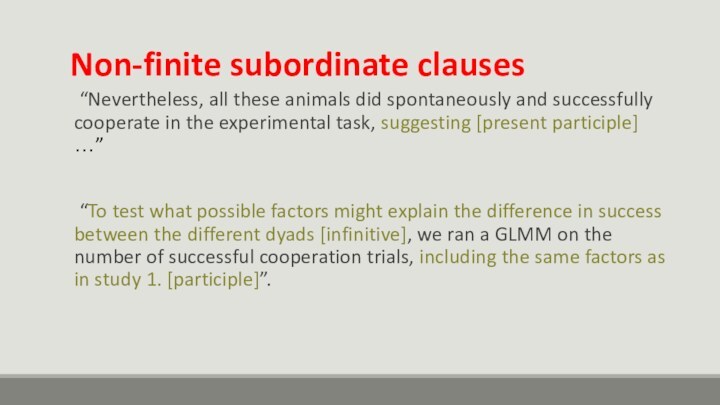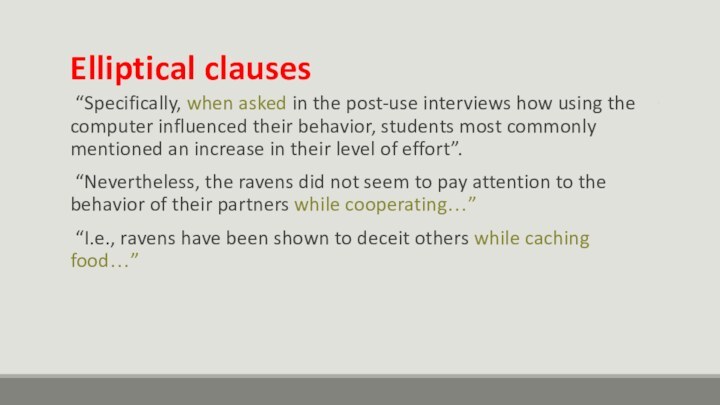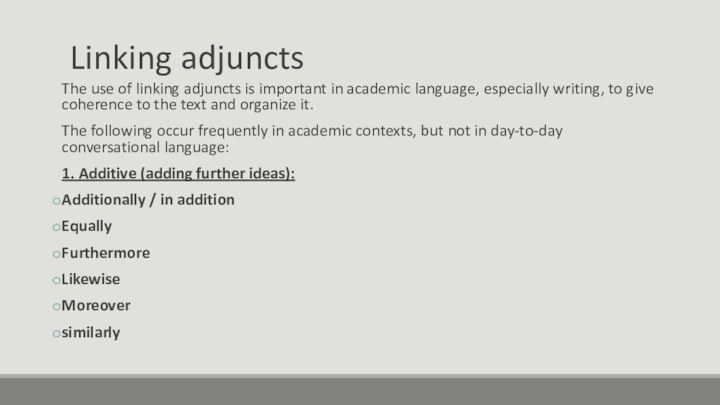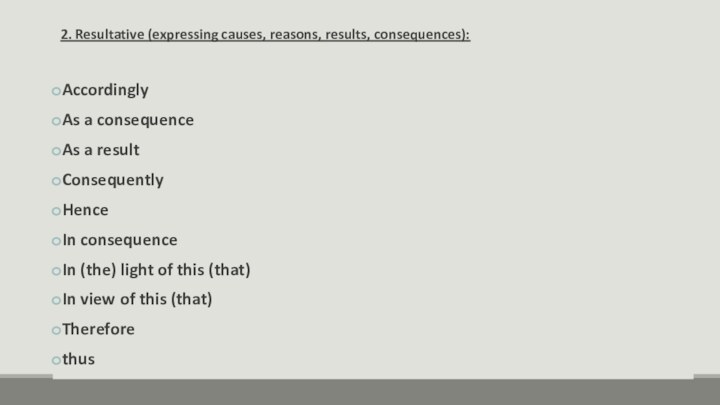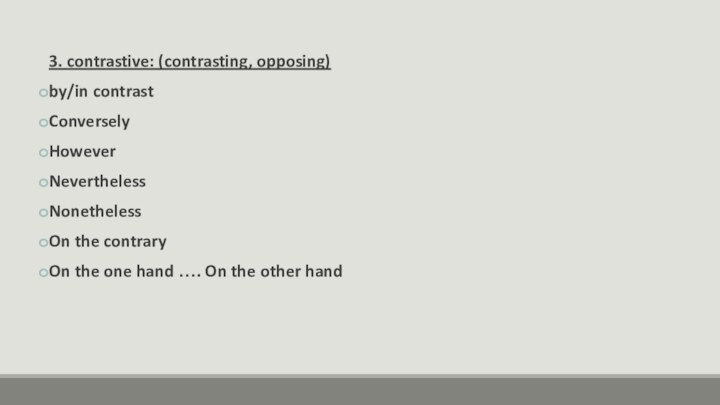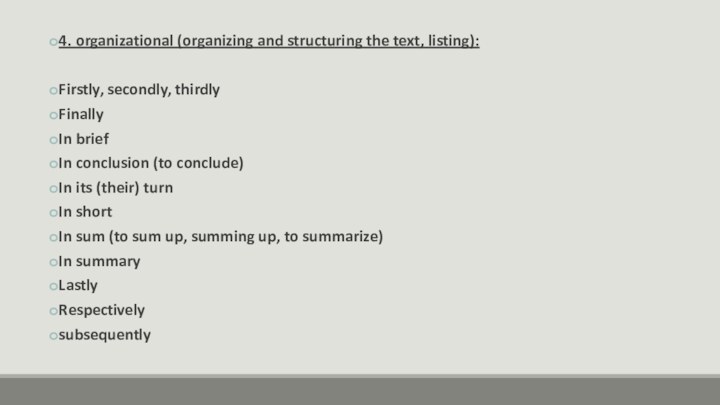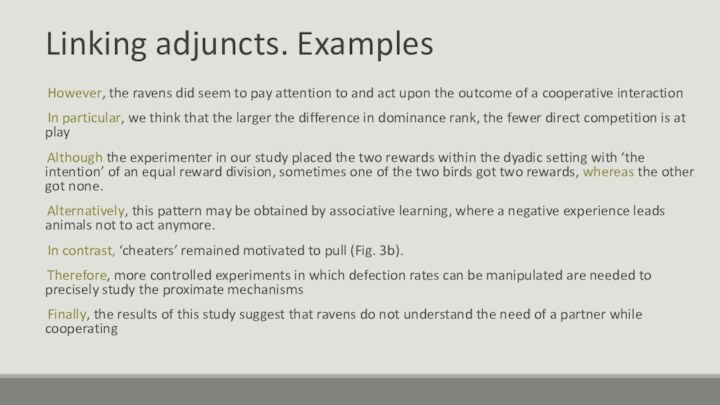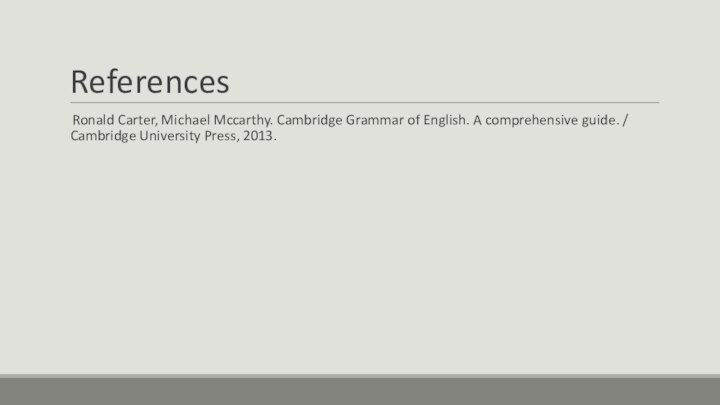Слайд 2
Boosting
Boosting is used in academic texts to make
a claim more assertive and is often carried out
by the use of a range of adverbial and prepositional constructions (plus some other types of expressions):
“This is clearly a very restrictive hypothesis, which requires verifications…”
Слайд 3
Noun Phrases
Noun phrases are very important structures in
academic English. Academic style, especially in writing, packs a
great deal of information quite densely into noun phrases.
Field observations have shown animal cooperation | within a variety of different social contexts|.
The underlined words are premodifiers (in this case they are nouns playing a role of attributes).
The phrase beginning with “within” is a postmodifying noun phrase. This type of phrases is also very frequent in academic English because of the need of specification and definition.
Слайд 4
More examples of premodifying and postmodifying noun phrases
“Environmental
fluctuations constitute a possible explanation for effective population sizes
inferred from genetic data”. (The Impact of Environmental Fluctuations on Evolutionary Fitness Functions, “Nature”, 2015)
“The latter becomes especially important as the crossover between selection driven and fluctuation driven evolution is a major focus of modern research”.
“To test our hypothesis that the drift term and the resulting stable fixed point is responsible for this behavior…”
“Zebra fish embryos are ideal for studying the formation of new blood vessels because they are naturally transparent, and many embryos can be collected every day”.
“Thornes and Shao tested the sensitivity of individual meteorological parameters in a road weather information system by using a range of input values.”
Слайд 5
Nominalisation
Nominalizations include nouns which express verb-type and adjective-type
meanings. They are more frequent in written academic style.
“All individuals (n = 7) had simultaneous access to the apparatus”. (Normal style would be: “All individuals accessed the apparatus simultaneously”)
“The time lag between marking and first recapture was higher than the lag between second and third recapture” (NOT “The time lag between when we marked the animals and when we first recaptured them…”)
Compare everyday style: “I decided to start a new experiment” and academic style: “The decision was (taken) to start a new experiment”.
Слайд 6
Using it, this and that
Reference to textual segments
is an important aspect of academic style. The impersonal
pronoun it and the demonstrative pronouns this and that are used in different ways to organize references to text segments and are frequently not interchangeable.
“They differentiated between a cooperative and solitary setting depending on the availability of a partner, and waited for the partner to come if it was delayed.”
“Low-luminance flickering patterns are perceived to modulate at relatively high rates. This occurs even though peak sensitivity is shifted…”
Слайд 7
Impersonal constructions
It-constructions:
It is possible that the apparent lack
of understanding in the current study is specific for
the paradigm used. It seems that the ravens had problems with inhibiting to pull when the partner was absent…
Existential there
“However, there is mixed evidence for social anointing in Sapajus.”
Third person self-reference
Academic writers often refer to themselves as “the author”, “the researcher”, and often refer to their work impersonally, especially in abstracts and summaries:
“The author focuses on the conflicts, stresses, and transformations…”
Слайд 8
Sentence patterns
Composite (both complex and compound) sentences are
very common in academic writing. In complex sentences different
types of subordinate clauses are used: subjects, object, predicate, attributive.
“Nevertheless, all these animals did spontaneously and successfully cooperate in the experimental task, suggesting that they can achieve cooperation through acting apart together [object subordinate clause], most probably motivated by a mutual attraction to the apparatus and the food.”
“Moreover, the distinction between species that do or do not understand the need and role of a partner [attributive subordinate clause] is not that clear-cut, because…”
Слайд 9
Non-finite subordinate clauses
“Nevertheless, all these animals did spontaneously
and successfully cooperate in the experimental task, suggesting [present
participle] …”
“To test what possible factors might explain the difference in success between the different dyads [infinitive], we ran a GLMM on the number of successful cooperation trials, including the same factors as in study 1. [participle]”.
Слайд 10
Elliptical clauses
“Specifically, when asked in the post-use interviews
how using the computer influenced their behavior, students most
commonly mentioned an increase in their level of effort”.
“Nevertheless, the ravens did not seem to pay attention to the behavior of their partners while cooperating…”
“I.e., ravens have been shown to deceit others while caching food…”
Слайд 11
Linking adjuncts
The use of linking adjuncts is important
in academic language, especially writing, to give coherence to
the text and organize it.
The following occur frequently in academic contexts, but not in day-to-day conversational language:
1. Additive (adding further ideas):
Additionally / in addition
Equally
Furthermore
Likewise
Moreover
similarly
Слайд 12
2. Resultative (expressing causes, reasons, results, consequences):
Accordingly
As a
consequence
As a result
Consequently
Hence
In consequence
In (the) light of this (that)
In
view of this (that)
Therefore
thus
Слайд 13
3. contrastive: (contrasting, opposing)
by/in contrast
Conversely
However
Nevertheless
Nonetheless
On the contrary
On the
one hand …. On the other hand
Слайд 14
4. organizational (organizing and structuring the text, listing):
Firstly,
secondly, thirdly
Finally
In brief
In conclusion (to conclude)
In its (their) turn
In short
In sum (to sum up, summing up, to summarize)
In summary
Lastly
Respectively
subsequently
Слайд 15
Linking adjuncts. Examples
However, the ravens did seem to
pay attention to and act upon the outcome of
a cooperative interaction
In particular, we think that the larger the difference in dominance rank, the fewer direct competition is at play
Although the experimenter in our study placed the two rewards within the dyadic setting with ‘the intention’ of an equal reward division, sometimes one of the two birds got two rewards, whereas the other got none.
Alternatively, this pattern may be obtained by associative learning, where a negative experience leads animals not to act anymore.
In contrast, ‘cheaters’ remained motivated to pull (Fig. 3b).
Therefore, more controlled experiments in which defection rates can be manipulated are needed to precisely study the proximate mechanisms
Finally, the results of this study suggest that ravens do not understand the need of a partner while cooperating
